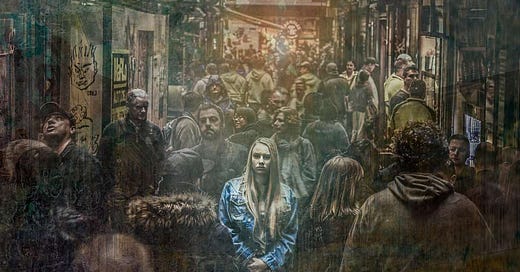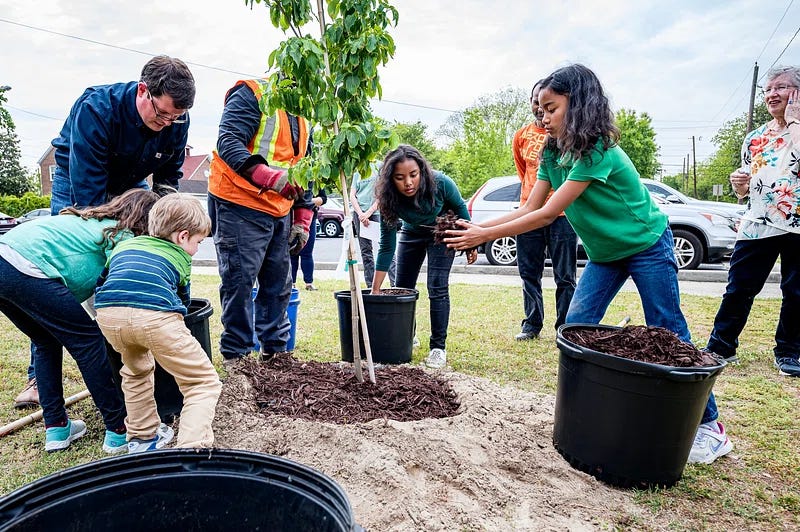I don’t know about you, but I have a good group of friends. I have a great relationship with my immediate and extended family (though I live a state away), and I’m happily married with a kid on the way…and I feel a nagging lack of connection that sort of undermines and permeates all I do. And I don’t think I’m the only one.
This is a big deal for us as individuals, and it’s a big deal for society at large. There are studies that show that lack of social connectedness is related to depression, general mental and physical health issues, even a decline in life expectancy. On the flip side, studies of blue zones find that social connection is a common thread across these pockets where residents live remarkably long and healthy lives. It’s no wonder that as more people leave religion, and more of life moves online, many of us are feeling disconnected and lost. As this happens, we’re giving up what used to connect us to others and give us purpose.
Many people are responding to this internal chasm by identifying more deeply with their political tribe or turning back to religious groups. Both are unfortunate: Digging into political ideology generally leads to anger, fear, and even disconnection as it leads people to be more online and cut off relationships that were important to them because of political differences. I don’t think there’s an issue with religious groups per se, but they tend to come with dogma that can be divisive for the culture more generally. And organized religion is not for everybody - my family members are all devout Christians, while I am not.
The foundation that we’ve eroded with our rugged individualism and drive for autonomy is not politics, it’s not religion - it’s community. I believe that as individuals, community provides the connection and meaning every human needs, and as a society (local, state, national) it provides the common ground we need to effectively work together in spite of our differences.
The word community is thrown around a lot, but you might have gathered that I have a particular type in mind. I like this description, from M. Scott Peck in The Different Drum: Community Making and Peace:
A community is a group of individuals “who have learned how to communicate honestly with each other, whose relationships go deeper than their masks of composure, and who have developed some significant commitment to ‘rejoice together, mourn together,’ and to ‘delight in each other, and make other’s conditions our own.’”
You can see this definition is not referring to casual references to interest or identity based “communities” - the business community, the gay community, the Christian community. It’s true that while these groups might rejoice together and mourn together, it’s simply because some interest or aspect of their identity means they are impacted similarly, not because of a commitment to do so. And most people within these groups don’t know each other, let alone have gone “deeper than their masks of composure.” In fact, it’s usually the opposite - people in these broad communities are expected to toe the party line rather than express any differences. Think of how the LGBTQ “community” responds to the conservative leaning folks among them. I’m not saying any of this is right or wrong, it’s just not the type of community we’re talking about.
The above also applies to closer interest groups, like a run club, CrossFit class, basketball league, business mastermind group, etc. The type of community that meets this definition, I believe, is a small(ish), local community. Peck actually believed there’s no upper limit to the size; that may be so, but let’s keep it in the hundreds or less for now.
What about a close friend group or family? Maybe…depends on the group/family. However, I think generally a friend group could never replace a community of the type I have in mind, and a community would never replace a close friend group. I think the best way to show that is to list what this type of community provides, and it will become clear what the difference is.
I think there are five key benefits to small, local communities:
Universal Personal Needs
I believe fulfillment in life comes from personal connection and contributing to something larger than oneself.
Local communities are large enough to give us a meaningful role in which we see the impact of our contribution. Sure, people are contributing to society via their jobs, but in many jobs (including mine) the doer is so far removed from the overall objective that their impact either is so distant as to be invisible or feels so miniscule as to be meaningless. I think this is a big reason people are disillusioned with their job or career as a whole.
While being large enough to provide a meaningful purpose, these communities are small enough that the individual doesn’t get lost in the crowd. They feel that they matter, and they’re right.
Resilience and Independence
When you’re down, the community helps you up. When you start a business, you have customers. When you need an expert you trust, you go to the community. Networks are resilient, and resilience creates independence from outside forces like the government, or the market. The government and market are not bad, but they are not within our control, so resilience to their changes and fluctuations is important. The stronger a community, the less its members have to rely on the government and capital wealth.
Increased Power to Do Good
It’s basically ancient wisdom that people as groups have more power to contribute to each other and more power to do good in the world in general. Small, local communities can be especially effective at this because by definition they are close to any local issue or effort and generally aren’t burdened by bureaucracy that siphons off resources for its own sake.
A Basis for Overcoming Divides
Connection and common ground are prerequisites for wrestling effectively with difficult issues, and it’s something that we need desperately. Organizations like Braver Angels are doing a good job addressing the issue head on, and I think building community first would go a long way to conversation in America.
A Fuller, More Fun Life
Community members are naturally exposed to a wider variety of people, ideas, and activities. They share more of their lives with the same people consistently over time. Community provides both breadth and depth in relationships.
Ok, now what?
The next step here is determining what this sort of community actually looks like in practice, and how to organize it. That’s a larger topic that I’ll write in depth about later, but for now here’s some key characteristics I think are required:
Local
Meets frequently in person
Based on common values
Based on a common purpose that arises from values
In the meantime, I’m curious to hear your thoughts on what I’ve written here. What has your experience with community been in the past? Are you involved in one (or multiple) now?





